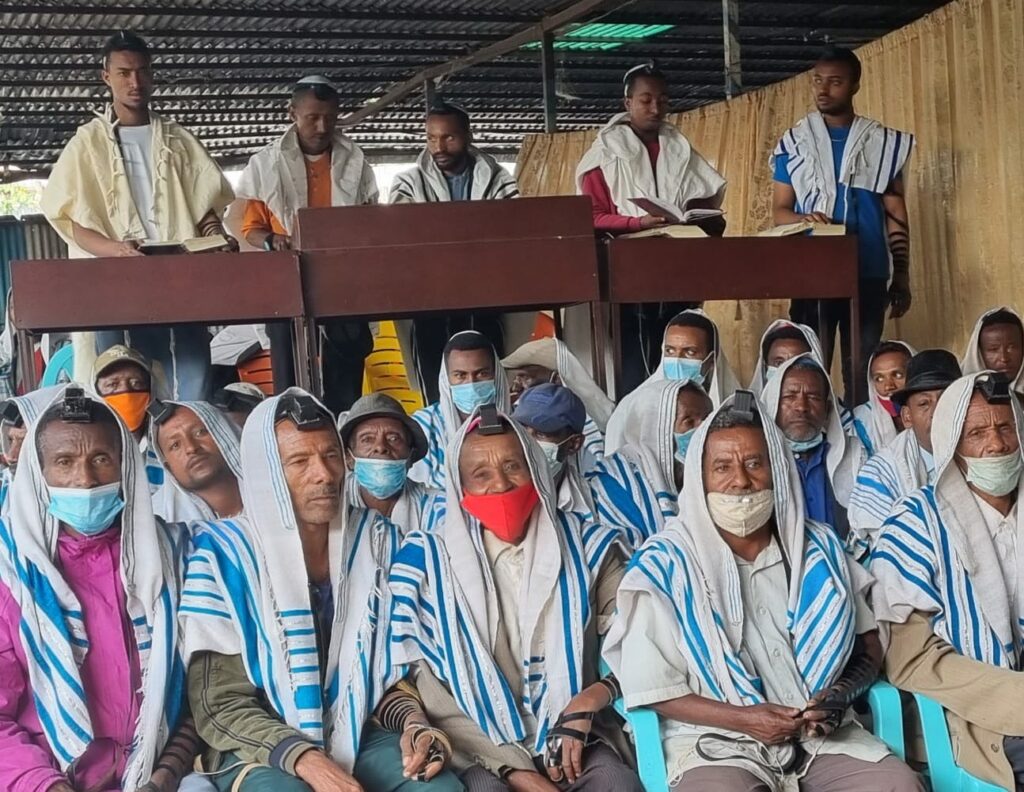
The Incredible Story of Ethiopian Jews and Their Journey to Israel
Published on: 13.3.2023By: Howard Flower ICEJ Aliyah director
This year, around 1,500 Ethiopian Jews are expected to immigrate to Israel, many with the help of the International Christian Embassy Jerusalem (ICEJ). Our next sponsored flight of Ethiopian Jews is scheduled for 30 March, and we will there to welcome them to the Promised Land on your behalf.
These new Ethiopian immigrants will be reunited with family members they have not seen in a long time, some for over two decades. “Sadly, in many cases brothers, sisters, even parents and children have been separated for years”, Danielle Mor of the Jewish Agency recently explained.
For over two millennia, Ethiopian Jews, known as Beta Israel, have faced immense challenges including religious persecution, discrimination, oppression, and violence. Despite these hardships, they have maintained their Jewish identity and community.
According to Ethiopian tradition, the Queen of Sheba’s son Menelik was born in Ethiopia. He later visited his father King Solomon in Jerusalem, who told him to spread the Jewish faith in God to the Ethiopians. King Solomon gave Menelik a Torah scroll to teach the Ethiopian people about Biblical Judaism.
Around 500 BC, a group of ancient Israelites also migrated to Ethiopia to escape religious persecution. Over the centuries, they became known as the “Beta Israel”. They developed a unique culture influenced by Judaism and Ethiopian traditions in isolation from other Jewish groups. Despite immense hardships, they stayed devoted to their faith and community.

In 1973, Rabbi Ovadia Yosef, the chief Sephardi rabbi of Israel, ruled that the Ethiopian Jewish community were Bnei Israel or “Sons of Israel”, according to Jewish law. This has allowed them to immigrate to Israel in large numbers.
The Beta Israel practice their own form of Judaism, distinct from the Jewish mainstream. They follow the laws of the Torah but not the Talmud. Their religious practices blend Jewish and Ethiopian traditions in a unique way after centuries of relative isolation.
For much of their history, the Beta Israel faced discrimination, oppression, and violence under various rulers and governments. Under Ethiopia’s dictator Mengistu Haile Mariam, they suffered from persecution, repression, and human rights violations. Many were forced to flee their homes and seek refuge in neighboring countries.
In the 1980s, Israel launched “Operation Moses” to help Ethiopian Jews escape persecution and emigrate to Israel. Thousands of Beta Israel embarked on the dangerous journey by foot, though many tragically did not survive. Those who made it to Israel faced significant challenges adjusting to a new culture, language and way of life after centuries of relative isolation in Ethiopia.
Thousands more came during the “Operation Solomon” emergency airlift in 1991, and despite the difficulties, the Beta Israel have thrived in Israel. They have excelled in fields like medicine, science and the military, while preserving their cultural heritage. However, not all Beta Israel were able to emigrate to Israel during these mass Aliyah airlifts, and many remained in Ethiopia waiting for their chance to finally reach the Land of Promise.
The situation was further complicated with the emergence of the Falash Mura, Ethiopians who claim Jewish ancestry but were not recognized as Jews by Israel due to forced conversions to Christianity several generations back. In 2003, Israel agreed to allow the Falash Mura to immigrate under certain conditions.

Israel officially recognizes the Beta Israel as a distinct Jewish ethnic group. It supports efforts to preserve their traditions and identity. Organizations worldwide also promote awareness of the Beta Israel’s rich history, faith and perseverance. The Beta Israel’s remarkable story should be celebrated as a source of inspiration, reminding us of the power of identity, faith and community.
The Ethiopian Jewish community in Israel now numbers around 150,000 people, and many are eager to bring home their close relatives left behind because they are Falash Mura. Thankfully, the last remnant of this proud, ancient people are now coming to Israel under humanitarian provisions of the Law of Entry.
“The Ethiopian Jewish community is considered one of the most ancient exiles of the Jewish people”, explained Danielle Mor of JAFI. “They are actually believed to be from the tribe of Dan, exiled by the Babylonians. They followed the Blue Nile south, away from Egypt and Yemen, eventually settling in Ethiopia. Heavily persecuted there for centuries, they lived in very rural, mountainous regions. They kept strongly to their Jewish faith in a very biblical way, cut off from the rest of the Jewish world. So, they followed more ancient, biblical traditions, not the traditions of the last 2,500 years.”
“Over the years since Israel was established, a connection has formed”, Mor continued. “They realized they could return to Jerusalem, which was always their dream.”

“Aliyah from Ethiopia begins with pre-flight preparations, and the flights are followed by a long integration process in Israel”, she added. “Arrival in the Promised Land takes so much more than just landing at Ben Gurion Airport! The journey includes settling here. This takes a little bit longer and requires learning Hebrew, getting an education, and finding employment that helps you build roots in the Land.”
Help us make dreams a reality for the remaining Ethiopian Jews waiting to make Aliyah! You can be a part of bringing them home and planting them in the Land of Israel. The next flight is only weeks away! Make your best gift today to support the ICEJ’s Aliyah efforts.
Donate at: help.icej.org/Aliyah